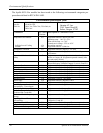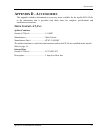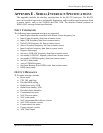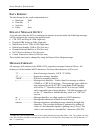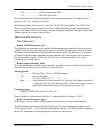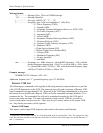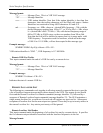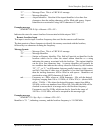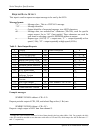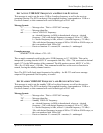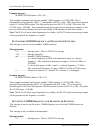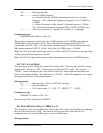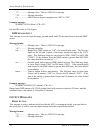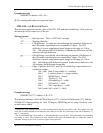
Serial Interface Specifications
64 Apollo SL30 Installation Manual
Message format:
“V”.................Message Class. This is a VHF NAV message.
“20”................Message Identifier.
vvvv ...............VOR station identifier. Note that if the station identifier is less than four
characters, then the trailing characters will be filled with spaces. Station
Identifiers are restricted to using ASCII characters 0-9 and A-Z.
mk ..................Frequency: m = MHz, where m = desired MHz frequency – 30h, with the
desired frequency ranging from 108 to 117, or 3Ch to 45h; k = kHz, where
k = (desired kHz offset / 25 kHz) + 30h, with desired frequency range of
000 to 975 kHz in 50 kHz steps, or the even numbers from 30h to 56h.
Note that the field will be checked to ensure that it is in range and a valid
VOR frequency. Frequencies used for localizers, which are in the range
of 108.10 to 111.95 MHz, will not be accepted in this message type.
Example message:
$PMRRV20UBG<Sp>E@<chksm><CR><LF>
VOR station identifier is “UBG ”, VOR frequency is 117.400 MHz.
Remote VOR List Trailer
This input command marks the end of a VOR list sent by a remote device.
Message format:
“V”.................Message Class. This is a VHF NAV message.
“21”................Message Identifier
Example message:
$PMRRV21<chksm><CR><LF>
Indicates the start of a remote VOR list.
REMOTE LOCALIZER LIST
The following two commands work together in allowing remotely connected devices to provide
a list of localizer frequencies associated with an airport to the SL30. The remote device should
first send the Remote Localizer List Header command (message identifier 22), followed by a
sequence of Remote Localizer Input commands (message identifier 23). The SL30 maintains a
single remote localizer list, so each new list received will replace any previous list. Subsequent
receptions of localizer lists for the same airport are ignored. There may be up to twenty entries in
the remote Localizer list. Any entries past twenty will be ignored.
Remote Localizer List Header
This input command marks the beginning of a Localizer list sent by a remote device. It specifies
the five character airport identifier associated with the localizer frequencies in the list.
Message format:



